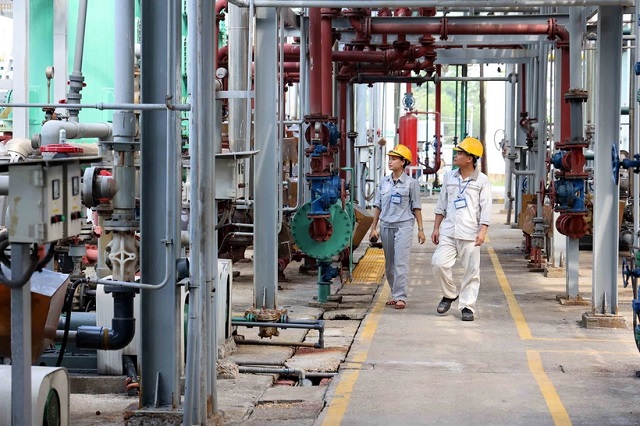
|
(Illustration by Trung Kiên/VNA)
|
According to the Ministry of Planning and Investment, none of the 19 enterprises approved for equitization have achieved this goal during the 2022-2023 period.
This result was mentioned in a report on the implementation of the rearrangement, equitization, and state capital divestment in enterprises during the 2022-2023 period, which was submitted to the Government leaders by the Ministry of Planning and Investment.
As per the plan approved by the Prime Minister, 19 enterprises were scheduled for equitization and 5 enterprises for rearrangement during the 2022-2025 period nationwide.
However, the Ministry of Planning and Investment reported that none of these enterprises have completed the equitization process in the first two years of this period (2022-2023).
Out of the 19 enterprises approved for equitization, 5 have established steering committees and support groups, while the remaining 14 are still in the preparatory stages of implementation.
These enterprises are facing various obstacles, such as the Limited Company for Application and Development of Science and Technology NEAD (under the Ministry of Science and Technology), which is facing challenges in determining land-use plans.
Several other enterprises are dealing with financial and asset issues and are in the process of rearranging their land use.
Regarding the 5 enterprises approved for rearrangement, 3 have completed the merger process, while the remaining 2 are implementing the rearrangement plan (with 1 enterprise undergoing dissolution and the other preparing for a merger).
The Ministry of Planning and Investment attributed the challenges and limitations in the equitization of state-owned enterprises to delays in land-use plan approvals by local authorities, especially for enterprises with land in multiple provinces.
Additionally, the legal provisions on state-owned enterprise equitization do not cover all scenarios that arise in practice, particularly regarding enterprise valuation, leading to prolonged equitization plan development and failure to meet the set deadlines.

|
Enterprises are facing various obstacles. (Illustration by Minh Hưng/VNA)
|
While the Law on Management and Use of Public Assets has been promulgated, its implementing documents are still inadequate and lacking in specificity, impacting the rearrangement and handling of public assets in state-owned enterprises.
Furthermore, some enterprises are facing difficulties in their production and business operations, negative owner’s equity, and social insurance debt, which affect the equitization process. Examples include the Limited Company for Vocational Education Equipment (under the Ministry of Labour, Invalids and Social Affairs) and the Limited Company for Import and Export of Agricultural Products and Food Agrexport (under the Ministry of Agriculture and Rural Development)
Additionally, some ministries and localities have not been proactive in implementing the equitization of enterprises under their management. The process of developing and approving decisions related to equitization has also been prolonged.
Based on the feedback from ministries, sectors, and localities, the Ministry of Planning and Investment reported that most units have requested to continue implementing the plan or the equitization scheme for enterprises included in the 2022-2025 plan.
However, some localities have proposed mechanisms to increase the state capital ratio in water supply enterprises with a current state capital ratio of less than 50%, or to include the fields of water exploitation, production, and supply, as well as urban and rural drainage, in the group of state-owned enterprises holding 65% or more of the charter capital.
This proposal aims to ensure state control and effective water supply to the people (in Hanoi, Can Tho, and Ha Tinh).
Based on the synthesis and evaluation of the implementation of the rearrangement, equitization, and divestment of state capital in enterprises during the 2022-2023 period, as well as the recommendations and proposals of ministries, sectors, and localities, the Ministry of Planning and Investment has proposed that the Prime Minister direct ministries, sectors, and localities to seriously and drastically implement the tasks to complete the equitization and divestment plans for the 2021-2025 period, as stipulated in Decision No. 22/2021/QD-TTg and Decision No. 1479/QD-TTg.
This is especially important for localities with a large number of state-owned enterprises that need to undergo equitization and divestment during the 2021-2025 period (Hanoi and Ho Chi Minh City)
For enterprises that have not yet started the equitization process, it is necessary to urgently implement it. In case of any difficulties, specific reports should be submitted to the competent authorities for guidance.
Regarding enterprises included in the divestment plan for the 2022-2023 period that have not completed the process, it is essential to clarify the difficulties and continue implementing the plan. If ministries and localities are unable to divest capital and propose transferring these enterprises to SCIC, detailed reports should be submitted to the Prime Minister for consideration and decision-making.
Thuy Hien
Prime Minister discusses investment, production, and business with 19 corporations and conglomerates
On the morning of February 5th, Prime Minister Pham Minh Chinh chaired a working conference with the State Capital Management Committee in Enterprises and 19 groups and corporations to discuss the implementation of production and business activities in 2024, as well as promoting investment for economic and social development.
Prime Minister holds meeting with 19 corporations, conglomerates to boost investments, manufacturing, and business.
On the morning of 5th February, Prime Minister Pham Minh Chinh chaired a working conference with the State Capital Management Committee for enterprises and 19 corporations and groups under its management to discuss the implementation of production and business activities in 2024 and promote investment for economic and social development.
Prime Minister Pham Minh Chinh: Corporations and State-Owned Enterprises must concentrate resources for investment and development
Prime Minister Pham Minh Chinh has called for a focused effort to remove legal obstacles, thereby facilitating smooth business operations. He emphasized the need to streamline the legal framework and decentralize power to ensure appropriate resource allocation. The aim is to create a conducive environment for businesses to thrive.
The Ministry of Transport and its efforts to tackle challenges
The determination of the Ministry of Transport in recent times, the focus on progress rather than setbacks, has helped put thousands of kilometers of highways and many major transport projects into operation. This resolute approach has been highly praised by the Government and the people, instilling a strong belief in this determined effort.
Empower Decentralization: Corporations and Conglomerates taking Ownership and Accountability
The Ministry of Planning and Investment is finalizing the consultation process on the draft Decree amending and supplementing certain provisions of Government Decree No. 10/2019/ND-CP regarding the implementation of the rights and responsibilities of state-owned enterprise representatives. The draft decree, which aligns with the Prime Minister’s directive to enhance decentralization and delegation of authority, will be submitted to the Government soon. Under the proposed amendments, conglomerates and state-owned corporations will have more autonomy and accountability.











































